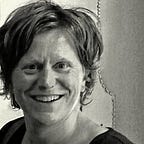Experts with opinions and experts with facts
I have muted the words “coronavirus” and “Covid-19” on Twitter. I hardly see any tweets about the coronavirus epidemic anymore. I would like to stay informed but felt that Twitter was no longer the right medium for that. The line between knowledge and opinion had blurred. I could no longer judge which information I should trust and which I shouldn’t. One scientist tweets that the number of infections is increasing exponentially, the other writes it isn’t. One thinks government measures are going too far, the other not far enough. All experts, but not in this area.
My class on critical thinking last week was about experts and expertise. “Who do you think is an expert on the coronavirus epidemic?” I asked the students of the bachelor’s program in human health. “The epidemiologist?” The first hesitated. The lesson couldn’t get a better start. “I am an epidemiologist,” I replied, “but I know almost nothing about epidemics.”
Expertise is subjective
An expert is someone with extensive knowledge and experience in a specific subject or area. Someone recognized by others for their expertise. An authority. Should someone be a professor or doctor? How many years of experience should someone have? There are no criteria for who is an expert in a particular subject or area. The assessment of expertise is subjective and relative. Someone is an expert…
